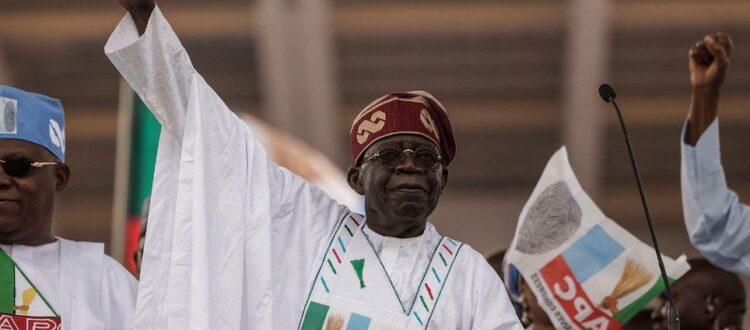NIGERIA: TINUBU’S VICTORY IS NOT GOOD FOR THE CLIMATE
A month ago, on 25 and 26 February, federal presidential elections were held in Nigeria. After an election campaign that lasted four months, the aggregate vote count in all the federated states saw Bola Ahmed Adekunle Tinubu (aka Bola Tinubu), former governor of Lagos State from 1999 to 2007 and national candidate for the All-Progressives Congress, a centrist party in power since 2015 with outgoing President Buhari, prevail with 36.61%.
With turnout at an all-time low of 26.71% and the other two contenders, Atiku Abubakar for the People’s Democratic Party (centre-right) and Peter Obi for the Labour Party (centre-right) standing at 29.07% and 25.40% respectively, the election result was immediately contested by the opponents and this created no small amount of confusion in the days following the election until the National Electoral Commission finally declared Tinubu the new President on 1 March 2023.
Africa’s leading economy and a country with a population explosion, already inhabited by over 230 million people, Nigeria was undoubtedly the country to watch at the start of this year in terms of elections, also considering its importance in the climate scenario. Despite a seemingly laughable 0.3% in terms of global CO2 emissions (which still makes it Africa’s fourth largest emitter), Nigeria’s economy is heavily dependent on the fossil fuel industry and on the oil industry. Oil, in fact, is the basis of 85% of the national revenue from foreign trade and the proceeds from its sale still account for over 50% of the national budget revenue, making Nigeria a fossil-dependent state for all intents and purposes. This a condition that the country does not seem to have wanted to renounce in recent years, given the almost 100 oil & gas projects scheduled to start up by 2025 and an impressive extraction potential, especially in the natural gas sector, which has led the country to increasingly invest in fossil subsidies.
If the country’s weight does not seem to stand out in terms of the global percentage of CO2 emissions, it does in fact make itself felt at the political level: at the regional level in ECOWAS, at the continental level in terms of trade and political dialectics within the African Union, and finally, in international climate negotiations. Under the Paris Agreement, Nigeria presented its own NDC (National Plan on Mitigation and Adaptation) in 2015, later updated in 2021, which envisages a 20% reduction in climate-altering emissions compared to the current scenario benchmarked to 2018 (‘Business as Usual’) by 2030, a target that can be improved up to a 47% reduction if there is financial support from abroad. A mitigation objective that, completed by a forecast of peak emissions within this decade in the presence of adequate financial support from abroad, is part of a broader strategy of diversification of energy supply sources. A strategy aimed at a gradual exit from the hyper-dependence of the state budget on oil, even after the powerful fluctuations in prices and trading volumes experienced during the pandemic years.
None of this, however, entered the election campaign, except in the case of one candidate – and with conflicting statements. A cursory analysis of the programmes and public statements of the three main candidates, Tinubu, Abubakar, and Obi, reveals that only Obi, the Labour candidate, has addressed the issue by launching a future ‘Green Army’, a sort of national task force charged with identifying and intercepting all possible sources of financing at the global level, to bring green investments in transition technologies and job creation for the youth to Nigeria, without however specifying how, when, and in what way this task force should operate. He went on, however, to make several statements about the need for the country to reclaim its national resources, oil and gas, in a renewed climate of investment in the sector and in particular in the gas sector, which is potentially more profitable than oil.
Little or nothing more on the subject from the other candidates. The analysts at Green Economy Tracker wanted to examine this election campaign even more in-depth, in a context dictated by a virtually empty or non-existent candidate and party websites and serious difficulties in tracking down speeches and videos on the topic from the various social channels. Their analysis confirms the first reading: almost no reference to the issue of climate and renewable energy in the election campaign, except for sporadic statements by Abubakar and a few, but more structured, releases by Obi. Nothing, neither in terms of statements nor of an electoral programme, from the newly elected Federal President Tinubu, who in his run-up only vaguely mentioned the 2060 carbon neutrality targets presented by the previous Buhari government – and this may not do the climate much good.
Nigeria’s role in international negotiations, as well as in continental politics, is that of a major economy capable of influencing the scenario, thanks to its weight in the regional ECOWAS forum and projections of its economic and demographic growth in the years to come. In the generic satisfaction of an election that, despite a very low turnout and some confusion over the final result, saw no violence or particular recriminations at the ethnic or regional level, a climate-insensitive Nigeria that is not oriented towards decisive mitigation policies and diversification of energy sources will not be able to stand as an ambitious player in the international scenario, aligning itself rather with those African countries that in the last year – since the beginning of the conflict in Ukraine – have taken more wait-and-see positions and oriented, towards the search for greater profits (think of the European countries that, like Italy, have started an active search for gas sellers to disengage from Moscow) in a scenario that is very uncertain but potentially, paradoxically, rich in opportunities. Even if they come from fossil fuels.
Article by Jacopo Bencini, Policy Advisor and UNFCCC contact point

